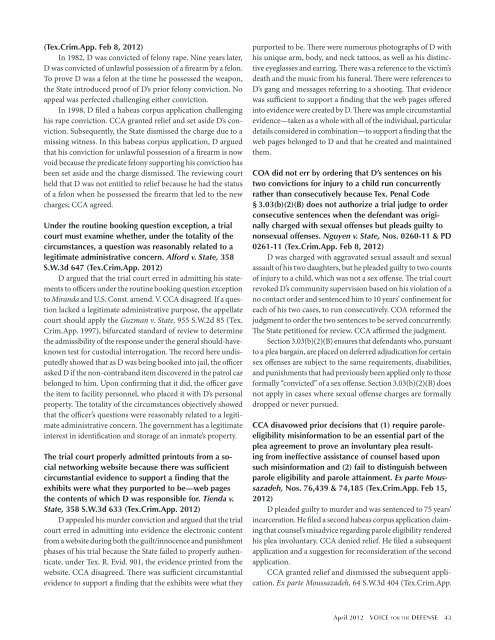for the defense for the defense - Voice For The Defense Online
for the defense for the defense - Voice For The Defense Online
for the defense for the defense - Voice For The Defense Online
Create successful ePaper yourself
Turn your PDF publications into a flip-book with our unique Google optimized e-Paper software.
(Tex.Crim.App. Feb 8, 2012)In 1982, D was convicted of felony rape. Nine years later,D was convicted of unlawful possession of a firearm by a felon.To prove D was a felon at <strong>the</strong> time he possessed <strong>the</strong> weapon,<strong>the</strong> State introduced proof of D’s prior felony conviction. Noappeal was perfected challenging ei<strong>the</strong>r conviction.In 1998, D filed a habeas corpus application challenginghis rape conviction. CCA granted relief and set aside D’s conviction.Subsequently, <strong>the</strong> State dismissed <strong>the</strong> charge due to amissing witness. In this habeas corpus application, D arguedthat his conviction <strong>for</strong> unlawful possession of a firearm is nowvoid because <strong>the</strong> predicate felony supporting his conviction hasbeen set aside and <strong>the</strong> charge dismissed. <strong>The</strong> reviewing cour<strong>the</strong>ld that D was not entitled to relief because he had <strong>the</strong> statusof a felon when he possessed <strong>the</strong> firearm that led to <strong>the</strong> newcharges; CCA agreed.Under <strong>the</strong> routine booking question exception, a trialcourt must examine whe<strong>the</strong>r, under <strong>the</strong> totality of <strong>the</strong>circumstances, a question was reasonably related to alegitimate administrative concern. Al<strong>for</strong>d v. State, 358S.W.3d 647 (Tex.Crim.App. 2012)D argued that <strong>the</strong> trial court erred in admitting his statementsto officers under <strong>the</strong> routine booking question exceptionto Miranda and U.S. Const. amend. V. CCA disagreed. If a questionlacked a legitimate administrative purpose, <strong>the</strong> appellatecourt should apply <strong>the</strong> Guzman v. State, 955 S.W.2d 85 (Tex.Crim.App. 1997), bifurcated standard of review to determine<strong>the</strong> admissibility of <strong>the</strong> response under <strong>the</strong> general should-haveknowntest <strong>for</strong> custodial interrogation. <strong>The</strong> record here undisputedlyshowed that as D was being booked into jail, <strong>the</strong> officerasked D if <strong>the</strong> non-contraband item discovered in <strong>the</strong> patrol carbelonged to him. Upon confirming that it did, <strong>the</strong> officer gave<strong>the</strong> item to facility personnel, who placed it with D’s personalproperty. <strong>The</strong> totality of <strong>the</strong> circumstances objectively showedthat <strong>the</strong> officer’s questions were reasonably related to a legitimateadministrative concern. <strong>The</strong> government has a legitimateinterest in identification and storage of an inmate’s property.<strong>The</strong> trial court properly admitted printouts from a socialnetworking website because <strong>the</strong>re was sufficientcircumstantial evidence to support a finding that <strong>the</strong>exhibits were what <strong>the</strong>y purported to be—web pages<strong>the</strong> contents of which D was responsible <strong>for</strong>. Tienda v.State, 358 S.W.3d 633 (Tex.Crim.App. 2012)D appealed his murder conviction and argued that <strong>the</strong> trialcourt erred in admitting into evidence <strong>the</strong> electronic contentfrom a website during both <strong>the</strong> guilt/innocence and punishmentphases of his trial because <strong>the</strong> State failed to properly au<strong>the</strong>nticate,under Tex. R. Evid. 901, <strong>the</strong> evidence printed from <strong>the</strong>website. CCA disagreed. <strong>The</strong>re was sufficient circumstantialevidence to support a finding that <strong>the</strong> exhibits were what <strong>the</strong>ypurported to be. <strong>The</strong>re were numerous photographs of D withhis unique arm, body, and neck tattoos, as well as his distinctiveeyeglasses and earring. <strong>The</strong>re was a reference to <strong>the</strong> victim’sdeath and <strong>the</strong> music from his funeral. <strong>The</strong>re were references toD’s gang and messages referring to a shooting. That evidencewas sufficient to support a finding that <strong>the</strong> web pages offeredinto evidence were created by D. <strong>The</strong>re was ample circumstantialevidence—taken as a whole with all of <strong>the</strong> individual, particulardetails considered in combination—to support a finding that <strong>the</strong>web pages belonged to D and that he created and maintained<strong>the</strong>m.COA did not err by ordering that D’s sentences on histwo convictions <strong>for</strong> injury to a child run concurrentlyra<strong>the</strong>r than consecutively because Tex. Penal Code§ 3.03(b)(2)(B) does not authorize a trial judge to orderconsecutive sentences when <strong>the</strong> defendant was originallycharged with sexual offenses but pleads guilty tononsexual offenses. Nguyen v. State, Nos. 0260-11 & PD0261-11 (Tex.Crim.App. Feb 8, 2012)D was charged with aggravated sexual assault and sexualassault of his two daughters, but he pleaded guilty to two countsof injury to a child, which was not a sex offense. <strong>The</strong> trial courtrevoked D’s community supervision based on his violation of ano contact order and sentenced him to 10 years’ confinement <strong>for</strong>each of his two cases, to run consecutively. COA re<strong>for</strong>med <strong>the</strong>judgment to order <strong>the</strong> two sentences to be served concurrently.<strong>The</strong> State petitioned <strong>for</strong> review. CCA affirmed <strong>the</strong> judgment.Section 3.03(b)(2)(B) ensures that defendants who, pursuantto a plea bargain, are placed on deferred adjudication <strong>for</strong> certainsex offenses are subject to <strong>the</strong> same requirements, disabilities,and punishments that had previously been applied only to those<strong>for</strong>mally “convicted” of a sex offense. Section 3.03(b)(2)(B) doesnot apply in cases where sexual offense charges are <strong>for</strong>mallydropped or never pursued.CCA disavowed prior decisions that (1) require paroleeligibilitymisin<strong>for</strong>mation to be an essential part of <strong>the</strong>plea agreement to prove an involuntary plea resultingfrom ineffective assistance of counsel based uponsuch misin<strong>for</strong>mation and (2) fail to distinguish betweenparole eligibility and parole attainment. Ex parte Moussazadeh,Nos. 76,439 & 74,185 (Tex.Crim.App. Feb 15,2012)D pleaded guilty to murder and was sentenced to 75 years’incarceration. He filed a second habeas corpus application claimingthat counsel’s misadvice regarding parole eligibility renderedhis plea involuntary. CCA denied relief. He filed a subsequentapplication and a suggestion <strong>for</strong> reconsideration of <strong>the</strong> secondapplication.CCA granted relief and dismissed <strong>the</strong> subsequent application.Ex parte Moussazadeh, 64 S.W.3d 404 (Tex.Crim.App.
















